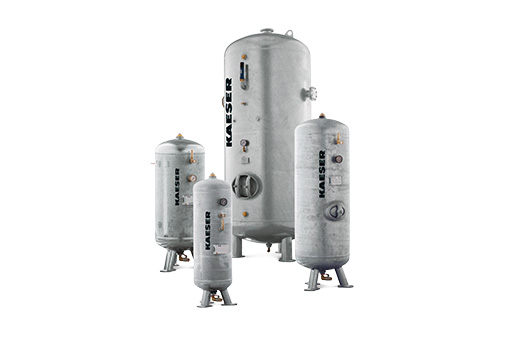Why is the inspection of compressed air systems essential for operators?
Compressed air systems have become indispensable in many businesses – whether in the automotive industry, the food sector, the chemical industry, medical technology, or wastewater treatment, as well as in car repair shops and many skilled trades. Compressed air is needed everywhere. What many operators underestimate, however, is that compressed air systems are among the systems requiring monitoring under the German Industrial Safety Ordinance (BetrSichV). This means that anyone who operates such a system bears clear legal responsibility for its safe condition and proper operation. This includes, in particular, regular inspections by qualified specialists.
Source: German Industrial Safety Ordinance (BetrSichV), Appendix 2, Section 4
Overview of Operator Obligations
The BetrSichV (Works Safety and Health Ordinance) stipulates that compressed air systems requiring monitoring must be inspected both before initial commissioning and at specified intervals. The goal is to prevent risks such as material failure, leaks, or accidents resulting from pressure. The classification is based on the so-called pressure content product—that is, the product of the operating pressure and the volume of the vessel. Depending on this classification, it is determined whether an approved inspection body (ZÜS) such as TÜV (German Technical Inspection Agency) must be involved or whether a qualified person may perform the inspection.
Source: TRBS 1201-2 "Inspections of Pressure Systems"
What inspection intervals apply?
For compressed air vessels, fixed maximum intervals generally apply, which are defined in the BetrSichV and the Technical Rules for Operational Safety (TRBS). Two types of periodic inspections are particularly relevant:
- Internal inspection: This checks the internal condition of the vessel, e.g., for corrosion or deposits. This inspection must be performed every 5 years.
- Strength test: This checks the vessel's resistance to increased pressure (test pressure = 1.3 x operating pressure). This inspection must generally be performed every 10 years.
Source: TÜV NORD – Overview of Pressure Vessel Inspection Intervals (tuev-nord.de)

Under certain conditions, such as for simple pressure vessels, the period for strength testing can be extended to up to 15 years – provided the internal inspection reveals no safety-relevant defects and the external condition of the system is safe. It is important to note that the operator is always responsible for correctly setting the intervals, based on a risk assessment.
Who is authorized to perform inspections?
The question of who is authorized to inspect a compressed air system is directly related to the system's hazard potential.
- Approved inspection bodies (ZÜS) such as TÜV SÜD, TÜV NORD, or DEKRA must be involved if pressure systems with a higher risk are involved – for example, large vessels or high operating pressures.
- Competent persons (befP) are permitted to perform inspections on systems with a lower hazard potential. These specialists must have appropriate professional training, several years of experience in handling pressure systems, and special safety qualifications. The requirements are defined in TRBS 1203.
This ensures that the audit is always carried out by persons with sufficient expertise, experience, and independence.
Source: TRBS 1203 "Competent Persons"

What documents must be kept on hand?
Complete documentation is crucial for an audit to run smoothly. The following documents should be available to the auditor:
- Manufacturer documentation and technical data of the system
- Calculation of the pressure-content product (pressure x volume)
- Risk assessment in accordance with the German Industrial Safety Ordinance (BetrSichV)
- Proof of maintenance and inspections
- Results of previous tests and test reports
- Operating manuals and checklists for safe operation
The risk assessment and a complete test and maintenance history are particularly important for correctly determining inspection intervals and demonstrating operational safety.
Source: TÜV SÜD – Compressed Air System Inspection, tuvsud.com
Note on Validity
The described obligations, inspection periods, and responsibilities refer to the legal situation in Germany according to the German Industrial Safety Ordinance (BetrSichV) and the associated Technical Rules (TRBS). Different regulations may apply in other EU countries. Operators should therefore always check the applicable national regulations or seek advice in a timely manner.
CONCLUSION
Regular inspection of compressed air systems is not a tedious formality, but an essential operator obligation to protect employees and systems. Consistent compliance with the legal requirements of the BetrSichV not only benefits from legal certainty, but also from greater operational safety and a longer service life of the compressed air system.
Operators should therefore check early on which deadlines apply to their systems, who is authorized to perform the inspections, and which documents must be available. Approved inspection bodies such as TÜV SÜD offer support in this regard, not only conducting inspections but also providing training for qualified personnel and checklists for inspection preparation.
Practical Guide: Successful Compressed Air System Inspection with FILCOM
Assess risk
FILCOM supports you in calculating the pressure content product and classifying your system – the basis for deadlines and inspection responsibilities.
Keep an eye on inspection intervals
Internal inspection every 5 years, strength testing every 10 years: FILCOM creates an inspection plan for you and sends timely reminders.
Coordinate the inspection body
Whether it's a ZÜS (certified inspector) or a qualified person – FILCOM takes care of organizing the responsible inspectors.
Provide documents
With FILCOM, you ensure that all documents (risk assessment, maintenance logs, inspection reports) are complete.
Inspection and follow-up
FILCOM optimally prepares your system, supervises the inspection, and ensures documentation and defect rectification.
With FILCOM, operators have an experienced partner who covers the entire inspection process – efficiently, legally compliant, and reliably!
ABOUT THE AUTHOR
Wilfried Leitenberger is Managing Director of FILCOM GmbH and an expert in compressed air technology. With his many years of experience in the industry, he stands for practical solutions, efficient processes, and the highest safety standards for compressed air systems.
Connect with him on LinkedIn.
Would you like your compressed air system inspection to be completed stress-free and reliably?
Then contact the FILCOM team directly now – your service partner for safety, efficiency, and complete legal compliance.
OUTLOOK TO THE NEXT POST
In the upcoming blog post, we will take a detailed look at the TÜV inspection of piston compressors – both stationary and mobile – as well as the special requirements for vessels that are permanently attached to machines. In addition to the legal requirements, we will provide a practical overview of what operators need to pay particular attention to in order to ensure long-term safety and efficiency.